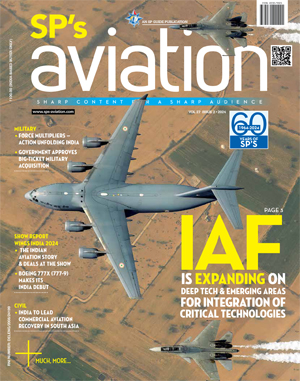INDIAN ARMED FORCES CHIEFS ON
OUR RELENTLESS AND FOCUSED PUBLISHING EFFORTS

SP Guide Publications puts forth a well compiled articulation of issues, pursuits and accomplishments of the Indian Army, over the years

I am confident that SP Guide Publications would continue to inform, inspire and influence.

My compliments to SP Guide Publications for informative and credible reportage on contemporary aerospace issues over the past six decades.
Catalytic Steps to Effectively Implement NCAP 2016
The implementation of the policy, in letter and spirit, is going to be more challenging, requiring an open-minded approach and flexibility

The new National Civil Aviation Policy (NCAP), released by the Ministry of Civil Aviation (MoCA) after due approval of Union Cabinet, has generally been hailed by the industry as the most visionary and comprehensive civil aviation policy since India’s independence. Most would agree with the view that, for the first time, such a widest and longest stakeholder consultation process was undertaken to accommodate views of all the affected segments of the aviation industry. The entire team involved in finalisation of NCAP deserves kudos from all the stakeholders of the industry. However, the implementation of the policy, in letter and spirit, is going to be more challenging, requiring an open-minded approach and flexibility.
NCAP aims to make domestic air travel affordable for the rapidly growing Indian middle class, especially connecting underserved and unserved airports, mostly located in remote areas of the country. The draft Regional Connectivity Scheme (RCS), released by MOCA on July 1, 2016, gives in details its features and, operating mechanism for supporting RCS routes through Viability Gap Funding (VGF) for up to three years. As the money for VGF would be generated by MoCA through 2 per cent levy on routes other than Cat II/IIA/RCS, the funds available, as part of RCS, are going to be limited to around Rs. 500 crore during a financial year. MoCA plans to prioritise all the proposals under RCS to address the availability of limited funds. It is suggested that while prioritising is always the right thing when funds are limited, more enabling environment needs to be simultaneously created to develop RCS routes with least availability of funds.
Encourage NSOP/BA Industry to develop RCS Routes. Non-scheduled and business aviation (BA) industry has the same multiplier effect on the industry, if not more, when it comes to connecting remote areas through air. NCAP recognises the fact that growth in populated metros/big cities would spill over to hinterland due to factors like high cost of land and labour. This would result in growing trend among business houses to set up industries in remote areas. Therefore, the first movers on RCS routes are going to be BA flights undertaken by corporate setting up new industries in the remote regions. Besides, BA industry is going to play a vital role in speeding up rail, road and power projects in remote areas. The NSOP industry is already providing Aero Medical Transportation for critically ill patients in remote areas and undertaking flights for conducting surveys, oil exploration and agricultural research. Helicopters, as part of NSOP industry, continue to be boon for pilgrims visiting remote and inaccessible religious places. All these activities boost economic growth and industrialisation of remote areas. During the implementation phase of NCAP, MoCA must consider giving all the RCS benefits to NSOP and BA industry, without providing any VGF support, as being done in case of cargo operations. Starting of scheduled operations to any region is generally preceded by regular non-scheduled flights. It is expected that by facilitating NSOP and business aviation flights on RCS routes, the need for VGF support for RCS flights would be reduced and, the limited VGF resources could then be optimally utilised to ensure balanced growth of air connectivity for all regions of India.
Reduce Ownership Cost for RCS/NSOP Aircraft. MOCA is anxiously looking at ways to reduce the cost of owning or leasing aircraft, as interest rates of above 12 per cent on loans is an additional burden on aircraft industry, given the thin operating margins. It is the time to follow the worldwide practice of Fractional Ownership and Aircraft Management Companies to overcome the avoidable burden of servicing interest on loan. The new CARs being prepared separately for Scheduled Commuter Airlines and NSOP should provide for Fractional Ownership model and functioning of Aircraft Management Companies.
Remove Ambiguity between Aeronautical and Nonaeronautical Services. NCAP envisages building of aircraft maintenance hangars at all future airports to boost maintenance, repair and overhaul (MRO) industry. However, the historical error by the Airports Authority of India (AAI), of treating maintenance hangars as non-aeronautical services at major airports, has been allowed to be perpetuated, in spite of subsequent promulgation of AERA Act. Periodic maintenance activity, to ensure continuous airworthiness of an aircraft, at an airport hangar cannot be termed as non-aeronautical—being integral part of aircraft operations. MoCA should address this issue immediately, as part of implementation of NCAP, to control the steeply increasing rentals for maintenance hangars at major airports.
Adhere to Target Date for e-GCA. NCAP has set target date as December 2016 for the start of e-GCA project at DGCA. This would ensure timely processing of all aircraft related transactions by the regulator in a transparent and objective manner. MoCA must ensure this target date is strictly adhered to for ‘ease of doing business’ and efficient functioning of DGCA.
The key objective of the new NCAP is to establish an integrated ecosystem which will lead to robust and sustainable growth of civil aviation sector – promoting tourism and achieving industrialisation of remote areas. It will not be prudent to deprive the NSOP/BA industry of the RCS benefits, barring VGF, as it is an essential part of the integrated ecosystem which NCAP aims to create for balanced regional growth.





